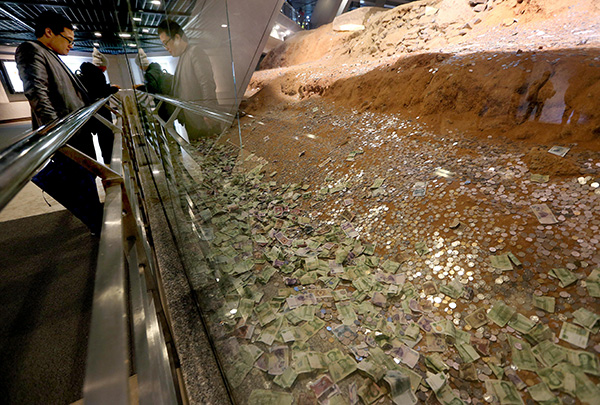Money woes: Relics buried beneath blankets of cash
 |
|
Coins and notes were thrown into a display at the Leifeng relic site by visitors seeking blessings. LIN YUNLONG / FOR CHINA DAILY |
Travelers' misunderstandings about throwing coins and notes onto historical relics for blessings has nearly ruined the 1,000-year-old Leifeng Pagoda in Hangzhou, Zhejiang province, according to a local newspaper.
The administrative unit of the Leifeng Pagoda scenic spot has been under pressure to protect the historical and cultural site. Piles of coins and notes virtually buried the relic, Qianjiang Evening News reported.
The reporter wrote that during a half-hour visit, "nearly half of all travelers threw money for wishes-mainly middle-aged women, children and young couples".
The Leifeng Pagoda, located in the West Lake scenic area, was originally built in AD 977. It has fallen and been rebuilt several times. Most recently, it collapsed in 1924 but wasn't rebuilt until 78 years later, in 2002.
The repair project unearthed an underground shrine, and the pagoda was built above it. Relics are now fenced within glass walls.
But the 2-meter-high walls didn't prevent the relics from becoming the objects of visitors' enthusiasm for blessings. People continued throwing money, and coins and paper notes blanketed the relics.
"We clean the site twice a month, and more frequently in peak season, so that visitors can enjoy viewing the relics instead of a money hill," said an administrative staff member, who noted that it all adds to the workload at the site.
According to the administration, more than 20,000 yuan ($3,000) is collected every year at the site. The money is used for maintenance of the relics, the newspaper reported.
Zhong Xiangping, vice-president of the Hangzhou Historical and Cultural Association, was quoted as saying some Chinese folklore holds that people throwing coins in specific spots can receive blessings and peace. Believers fear missing any chance at a blessing, so they toss coins or notes just about anywhere after finding that some previous visitors had done the same thing.
Last month, an 80-year-old woman boarding an aircraft at Shanghai Pudong International Airport even threw some coins into the engine as a blessing for a safe flight. The flight was delayed for five hours while the engine was checked.
In Zhong's view, unlike the Trevi Fountain in Italy, Leifeng Pagoda is just a historic relic. "It has no function for blessings," Zhong said.
Throwing money also hinders relic protection efforts.
"The administrative organizations should do more to regulate visitors' behavior," Xinhua News Agency said in an earlier editorial opinion.
A staff member at the pagoda told the newspaper that notices posted on the glass wall tell people not to throw money.
"Patrolling staff members have also tried to dissuade people from doing that. People just ignored them. We hope the public will give us ideas to cut down on the problem."


























